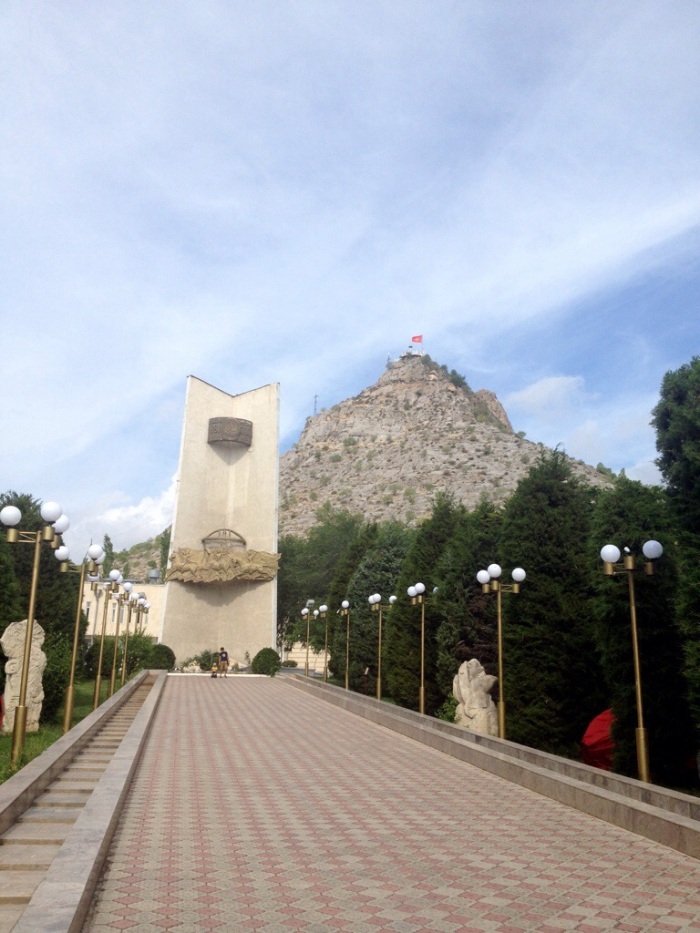Before embarking on my trip to the Pamir Highway, I told a few friends in Almaty that the two towns in Tajikistan I was planning to visit, Murghab and Khorog, have names that sound like they require crossing the River Styx to get to. With their hellish names, I found that if these two towns of Eastern Tajikistan are, in fact, somewhere beyond the fifth circle of hell, then it would follow the synonym that the town of Osh, in Southern Kyrgyzstan, is purgatory.


After four days of waiting in Osh to find companions and transportation to the Gorno-Badakshan Autonomous Oblast (Eastern Tajikistan), Osh became my own personal purgatory. While I did end up meeting some fantastic people there, I spent the first few days as the single tenant of the hostel I was staying in, eating alone in the many yet unbelievably similar tea and laghman shops near the hostel, and wandering through the massive bazaar to get to Solomon’s Throne. Even when I found other travelers who were headed to China or to Bishkek, I did the same things with company, but still waiting, always waiting, for someone, anyone, to accompany me on the journey to Tajikistan.


This time waiting was foreshadowed by a solid five hours in the Bishkek long-distance bus station, hoping for other people, travelers or locals, headed to Jalal-Abad or Osh, to help fill the mini-van I intended to travel in. I eventually ended up buying two seats to leave at noon in the hopes I would not have to wander through the streets of Osh at night finding a hostel. Thankfully, even though we did arrive at night, the woman who was helping organize a trip to Peak Lenin for Björn and I later that month took time away from her birthday party to escort me to the hostel from the city’s entrance.


The drive from Bishkek to Osh, albeit significantly faster than legally permissible thanks to the driver’s heavy foot, was simply beautiful. The Kara-Balta Valley, Tör-Ashuu Pass, and the Naryn River Canyon were especially wonderful, but my absolute favorite was the Suusamyr Valley, with its green pastures and only a few summer yurts set up for the summer. After exiting Naryn Canyon, we traveled along the Kyrgyz-Uzbek border to Jalal-Abad, which was the terminal stop for the majority of the taxi’s passengers. Only the taxi-driver, the oldest passenger, and myself continued further south as the sun set over the Fergana Valley.


Osh is not exactly an exciting city. The main attraction is the bazaar, which is massive, but full of all the things you find at every bazaar in Central Asia: fresh fruit and vegetables, plastic products and cheap clothing from China, and police looking to hassle foreigners. The other main highlight, in my eyes at least, was Solomon’s Throne, a craggy hill that rises above the town. At the top of the paved path that rises up the mountain is Dom Babura, a private mosque originally built in 1497 but has been rebuilt several times since then. Most pilgrims only make it to here, but just beyond are a series of trails that lead to some interesting caves and cliffs which I scouted during my first walk up there.



After three days in Osh, I eventually found other travelers, and they too wanted to check out Solomon’s Throne. I took the opportunity to stretch my legs with a run on the trails that sprawl out on the other craggy hills beyond the little mosque. The short run felt fantastic, and I was rejuvenated for the rest of the afternoon to stay optimistic about the journey ahead. Sure enough, within 24 hours, a Danish man and his English wife arrived in Osh, looking to travel on the Pamir Highway. I joined their crew, and soon it was time to travel south.












